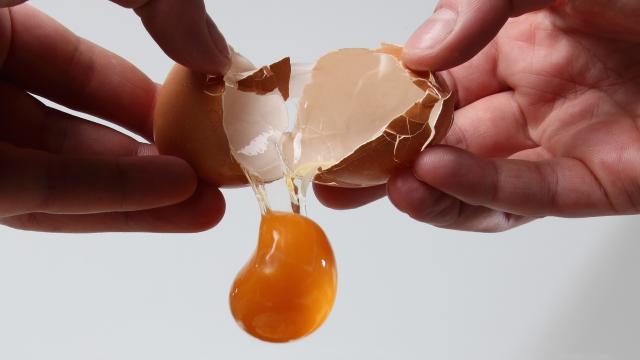Breakfast sandwich fans beware: Eating too many eggs might be bad for your health… again. A new study released this week found that daily consumption of a certain amount of cholesterol, a key nutrient of eggs, is linked to a modest increase in the risk of cardiovascular disease and early death.
The findings, if valid, could overturn the current medical consensus that there’s no need to watch your cholesterol or egg intake — itself a controversial idea among nutritionists.
In 2016, the United States Department of Agriculture finalised its current five-year update of the Dietary Guidelines for Americans, meant to run until 2020.
There was one change from previous guidelines that got everyone’s attention. The USDA no longer called for a upper limit to the amount of dietary cholesterol you should have, which was previously set at 300mg a day (one large egg alone provides around 160mg).
Instead, the guidelines said, dietary cholesterol shouldn’t be considered “a nutrient of concern for overconsumption”.
The USDA’s decision, which did receive some criticism at the time, reflected the latest shift in thinking around cholesterol in the nutrition world.
To put it simply, studies haven’t consistently shown that more cholesterol in our diets leads to more cholesterol in the blood, particularly the unhealthier low-density lipoprotein (LDL) cholesterol, which can contribute to clogged arteries and heart disease.
Nor have they clearly shown that eggs and dietary cholesterol are linked to poorer health, since factors such as a person’s overall diet can cloud the picture. People who love to eat eggs, for instance, might also love eating unhealthier foods like bacon in general.
The authors behind this new paper, published in JAMA, acknowledge the long-standing debate around eggs’ benefits and harms. But they argue that their study’s design and methodology was able to separate the wheat from the chaff and look at the effects of cholesterol and eggs in isolation and in more detail than other attempts.
“With eggs, like most foods, there are good and bad parts to them. And it’s been very hard to tease apart the potential harmful effects of high cholesterol in eggs vs other beneficial nutrients,” study author Norrina Allen, associate professor of preventive medicine at the Northwestern University Feinberg School of Medicine in Illinois, told Gizmodo.
They turned to the Lifetime Risk Pooling Project, which combines data from 20 large population studies that have tracked people’s health over years to figure out risk factors for cardiovascular disease.
For this study, they used data from six studies, which collectively involved nearly 30,000 relatively healthy, middle-aged people with no pre-existing heart disease and followed them for a median of 17 years and up to as long as 31 years.
All of the volunteers, at the start of their respective studies, detailed their typical diet, including how much they ate eggs and other high-cholesterol foods like red meat.
Ultimately, they found there was a 17 per cent increased risk of cardiovascular disease associated with every extra 300mg of dietary cholesterol a day, along with an 18 per cent increased risk of early death, even after adjusting for factors such as the number of kilojoules eaten per day.
And each extra half-egg a day was similarly linked to a six per cent and eight per cent increased risk of cardiovascular disease and early death, respectively.
The link between egg consumption and poorer health went away after accounting for a person’s cholesterol intake, suggesting their high cholesterol content was the principle reason behind the increased risk.
The findings, Allen said, might prompt yet another reconsideration of health organisations’ advice to not worry about dietary cholesterol or eggs.
“I think [organisations like the USDA] were working with the best evidence they had available, which has never been conclusive,” she said. “But this study is a large, very strong observational study that may start to change the balance of data.”
At the same time, Allen and her team caution that people shouldn’t be too worried about their egg-eating habits. For one they aren’t the only major source of cholesterol in our diet; processed and red meats provide plenty, too. And unlike some studies, this one included more of a real-world context.
The researchers estimated that the absolute risk difference linked to eating 300mg of cholesterol a day, over a 31-year-period, was 3.24 per cent for cardiovascular disease and 4.43 per cent for mortality.
In other words, if your risk of heart disease in the next 31 years was five per cent (hypothetically), eating that much cholesterol would raise it to around eight per cent. That’s an important increase, one most of us would probably want to avoid. But it’s still a small added risk in the grand scheme of things.
Allen believes that this study and others like it in the future could be enough to convince the USDA and other health organisations to revise their cholesterol advice. But there are also steps they say the average person can take right now.
“We’ve known for a long time that the yolk in eggs is the main source of cholesterol found in them. So we would advocate that people reduce their cholesterol intake, and if you’re eating eggs, that maybe you just eat the egg whites and moderate your consumption of yolk,” Allen said.
“Also, eggs aren’t the only thing cholesterol comes out of, so people should moderate their consumption of those foods as well.”
In the future, Allen hopes she and others can establish a clear threshold of perfectly safe egg consumption, as well as whether certain individuals respond differently to dietary cholesterol.
